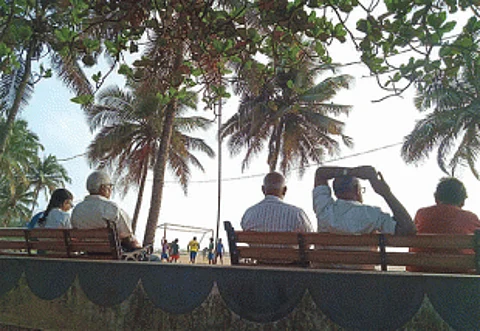

As Goan villages are emptying out with the gradual surge of migration abroad, the
trend of returning home to a family after retirement no longer exists. With
entire families moving away towards greener pastures, the elders of those
families are mostly being left behind, with excuses such as not being able to
adjust to a new life abroad or the need to look after the ancestral homes.
In Goa, crimes against senior citizens are
very low compared to other states of India but there are other forms of abuse
like neglect that happens. Every year, on June 15, World Elder Abuse Awareness
Day (WEAAD) is commemorated around the world to raise awareness about the
millions of older citizens who experience abuse, neglect, and financial
exploitation.
The Goa Police launched a toll free senior
citizens helpline 1090 four years ago to help elders in case they needed any
assistance, medicines or to complain about abuse. “We very rarely receive calls
on the toll free senior citizens helpline 1090 as it is almost nonexistent. It
is a very good sign as it shows that the Goan society is educated and knows how
to take care of their elders. We have beat officers, who have all the data
about the senior citizens in their patrolling area and even the Police
Inspector visits the citizens and spend time with them. We even wish them on
their birthdays and invite them for programs. This helpline is open all over
Goa and especially concerned about senior citizens who are living alone,” says
IGP Jaspal Singh.
Speaking to people including elders, care
givers and in charge of homes, one gets the feeling that not all is said to the
extent that there is an effort to keep the unsaid buried, since negative
comments about one’s family brings disrepute
Sr Nancy D’Souza is in charge of the Holy
Spirit Home, Moira, which houses 30 members including the nuns. Run by the
Handmaids of Christ, the home has only women that are either widows, spinsters,
have no living family members or are living alone without their family. “We
have some members that have families but they are abroad. It is compulsory for
them to take them home when they come down on holidays. When at home, all are
treated very well and the complaints include that they are missing their time
at the home. Some even prefer coming back to the home earlier than their stay.
Here, they are accustomed to the food on time, the daily mass and community rosary.
Some families come on holiday after a year
or two years and they find it difficult to live with them after spending so
much time in the company of the other members. There is a waiting list for
those who want to join the home. We have not received any complaints of abuse
of any form when they go home except that they feel bored,” says Sr Nancy.
Second Innings, a recreational centre for
senior citizens in Bicholim is run by Baba Savaikar Seva Trust in collaboration
with Bicholim Lions Club. “This year, we will be celebrating 11 years on
October 2. Second Innings is open from 9am to 7pm and on the lines of Umeed
centres run by the Government. We have 2-3 carrom boards, a collection of
tabla, harmoniums and cymbals, TV, CDs and outdoor activities like shot put and
javelin throw. We have participated in the All Goa Senior Citizens sports meets
and have won awards in categories of 60-65 years and 65 years and above,” says
Ramakant Shetye, a trustee member.
While the men mostly spend their time at the centre, women are
very rarely seen here. “Women never retire. They always keep themselves busy at
home itself but these men have been regularly coming from all over Bicholim,
including a 97-year-old.
According to the Maintenance and Welfare of and Senior Citizens
Act, it clearly mentions that they cannot be abused. But this abuse comes from
their own children or their in laws and as such they don’t want to openly talk
about it and it is brushed under the carpet,” says Ramakant.
Though the elders don’t want to talk about the abuse, it is
usually their own children who are putting them out of the house or mentally
harassing them, leaving them to fend for themselves. Esperance Rodrigues,
Convenor of the Chorao Civic and Consumer Forum also overlooks the Senior Citizen
Cell, which runs a day care centre in Chorao. The centre educates the senior
citizens in different arts and crafts, which teaches as well as infuses a sense
of self satisfaction at this age. “Chorao is a small island but there are over
200 senior citizens living here and many are living by themselves. Either their
children are abroad or they are widows. There is abuse on the elders but it is
not reported. Neglect is also a form of abuse as they are left to fend for
themselves and experience utter loneliness. Being an island, transport is a
huge problem to get in and out of the island and even once you cross the ferry
to Ribandar, you have to walk a lot to catch a bus. Also, there are no resident
doctors on the island,” says Esperance.
It
is clear that after their sunset years, the night is long. The biggest form of
abuse is neglect or lack of communication by children. And this becomes
difficult to live with if you are in a remote island with no transport and easy
access to medical help. Which is why, old age homes are preferred by the
elderly because it gives them a community feeling to ward of loneliness. Hence
on a day like this and always, the “abuse” is never seen and heard. It is felt
in the silence of the long nights.